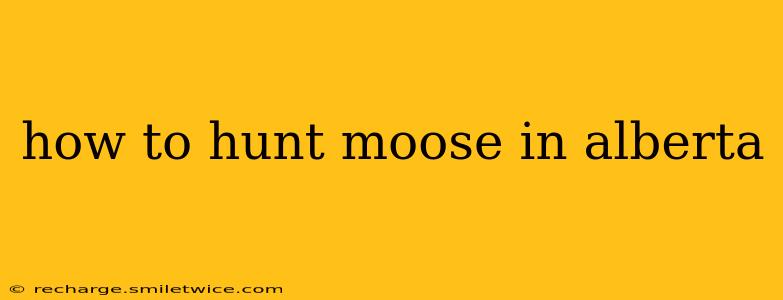Hunting moose in Alberta is a thrilling experience, demanding skill, preparation, and respect for the majestic animal and its environment. This guide provides a comprehensive overview of the process, from obtaining a license to ethical harvesting and processing. Whether you're a seasoned hunter or a newcomer to the sport, understanding these crucial aspects ensures a safe, successful, and responsible hunt.
What are the requirements to hunt moose in Alberta?
Before you even think about tracking a moose, you need the proper licensing and permits. Alberta's hunting regulations are strict and vary by Wildlife Management Unit (WMU). You must obtain a valid Alberta hunting license, a moose hunting license (which often requires a draw system), and potentially additional permits depending on the specific WMU and hunting method. Failure to obtain all necessary documentation before your hunt is a serious offense. Check the Alberta Government website for detailed, up-to-date information on license requirements and application deadlines. These regulations change frequently, so confirming details closer to your intended hunting season is crucial.
What is the best time of year to hunt moose in Alberta?
Alberta's moose hunting season typically runs from September to November, though the exact dates vary by WMU. The best time to hunt often depends on your preferred hunting method and the specific WMU's conditions. Early season hunts often find moose in riparian areas, while later season hunts might find them at lower elevations as snow accumulates. Understanding the seasonal migration patterns and habitat preferences within your chosen WMU is key to a successful hunt.
What is the best hunting method for moose?
Several methods are employed for moose hunting in Alberta, each with its own advantages and challenges:
-
Spot and stalk: This involves carefully scanning the landscape for moose, using binoculars and spotting scopes to identify targets from a distance. This approach necessitates patience, stealth, and a thorough understanding of moose behavior and habitat.
-
Calling: Moose are responsive to calls mimicking their vocalizations. Experienced hunters use calls to lure moose closer, increasing the likelihood of a successful shot.
-
Baiting: (Regulations vary by WMU and may require specific permits). This involves placing bait to attract moose to a specific location. Regulations surrounding baiting are strict, and it's crucial to comply with all legal requirements.
The best method often depends on your experience level, the terrain, and the specific conditions within your WMU.
What gear do I need to hunt moose in Alberta?
Proper gear is paramount for a safe and successful moose hunt. Essential items include:
-
Firearm: Choose a high-caliber rifle suitable for moose hunting, such as a .30-06, .300 Winchester Magnum, or similar. Ensure you're proficient in its use before heading out.
-
Optics: High-quality binoculars and a spotting scope are crucial for spotting moose in their natural habitat.
-
Clothing: Layered, waterproof, and warm clothing is essential, as conditions can change rapidly.
-
Boots: Sturdy, waterproof hunting boots are critical for navigating potentially challenging terrain.
-
Navigation tools: GPS, map, and compass are essential for safety and navigating unfamiliar areas.
How do I prepare for a moose hunt in Alberta?
Preparation is key. Beyond obtaining licenses and gathering gear, consider:
-
Physical fitness: Moose hunting can be physically demanding; ensure you're in good physical shape before embarking on a hunt.
-
Hunter safety course: Completing a hunter safety course is crucial for learning safe firearm handling and ethical hunting practices.
-
Scouting: If possible, scout your hunting area beforehand to familiarize yourself with the terrain, identify potential moose trails, and understand the local conditions.
-
First aid training: Knowing basic first aid is essential for handling any potential injuries.
What are the ethical considerations for moose hunting in Alberta?
Ethical hunting practices are paramount. This includes:
-
Respect for the animal: Treat the animal with respect, both before and after the harvest.
-
Clean, ethical kill: Ensure a quick and humane kill to minimize suffering.
-
Proper meat handling: Properly field dress and process the meat to ensure its quality and safety.
-
Compliance with regulations: Adhere to all applicable regulations and laws.
By carefully following these guidelines, preparing thoroughly, and maintaining respect for the animal and its environment, you can significantly increase your chances of a successful and ethical moose hunt in Alberta. Remember, always consult the official Alberta Government website for the most current and accurate hunting regulations before your trip.
